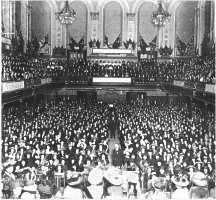
Ulster Women's Unionist Council meeting,
Ulster Hall, Belfast, Jan. 1912
Photograph reproduced with the kind permission
of the Museums & Galleries of Northern Ireland
Unionists opposed the first Home Rule Bill for Ireland which was introduced in 1886. Isabella Tod was an activist in Belfast in movements to repeal the Contagious Diseases Acts, to obtain women's suffrage and to improve education for girls. In 1886, she founded a Liberal Women's Unionist Association to oppose Home Rule.
| I can scarcely write of the sickening shock of the Home Rule proposal of 1886. Knowing Ireland thoroughly, I knew that all the social work in which I had taken so prominent a part for twenty years was in danger, and that most of it could not exist for a day under a petty legislature of the character that would be inevitable ... I shrank in horror from the revival of the religious and racial difference which was certain to ensue. Isabella Tod writing in 1892, quoted by Maria Luddy in Mary Cullen & M. Luddy, Women, power and consciousness, Dublin, 1995, p.221. |
In June 1892, Isabella Tod helped organise a meeting in the Ulster Hall, Belfast:
| Banners placed around the hall displayed the mottos 'Keep our noble kingdom whole' and 'British freedom, British laws and British citizenship.' Maria Luddy in Mary Cullen & Maria Luddy, Women, power and consciousness, Dublin, 1995, p.223. |
When the Second Home Rule Bill was introduced in 1893, Unionist women organised demonstrations, lobbied politicians and travelled to London to make their case and addressed a memorial to Queen Victoria with 103,000 signatures.
| ... Those of your Majesty's memorialists who reside in Ulster, where the principal manufactures of this country are carried on, thereby providing a large amount of employment for women as well as men, creating a condition of more than average comfort, dread the removal of the trade and capital which have caused this prosperity, ... Quoted in Maria Luddy, Women in Ireland 1800-1918, Cork, 1995, p.323. |
Many unionist women, north and south, dreaded the economic consequences of Home Rule, believing that the liberty of the subject and the free exercise of religion would be endangered and that the British Empire would be weakened.
The Ulster Women's Unionist Council was founded in 1911 ahead of the Third Home Rule Bill and within a year, had over 40,000 members.
| In 1911, in response to the Ne Temere decree of Pope Pius X, (which declared that marriages between Catholics and Protestants were null and void unless solemnised according to the rites of the Catholic church) the UWUC prepared a petition to the House of Commons. By April 1912 this petition measured one mile in length. Maria Luddy, 'Placing women in Irish history' in Stair, Journal of the HTAI, 1993, p.3. |

Ulster Women's Unionist Council meeting,
Ulster Hall, Belfast, Jan. 1912
Photograph reproduced with the kind permission
of the Museums & Galleries of Northern Ireland
On 'Ulster Day', 28 September 1912, Ulster's Solemn League and Covenant was signed by 234,046 women and a parallel one by 237,368 men.
Unionist and other women throughout Ireland formed groups to support the soldiers fighting in World War One.